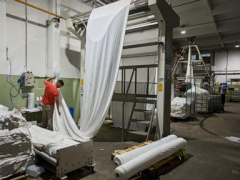BUENOS AIRES, Argentina — BUENOS AIRES, Argentina (AP) — The factory floor used to roar.
Walking around his textile mill in southern Buenos Aires, Luciano Galfione pointed out the up-to-the-minute machines that once whirred and clattered as 200 employees churned out fabric to be transformed into athleisure and other apparel for Argentina’s vast middle class.
But on Monday afternoon, the factory was so quiet that Galfione’s footsteps rang clear through the compound. A handful of workers at the Galfione Group factory in Argentina’s capital spooled yarn and dyed cloth.
Almost two years after libertarian President Javier Milei stormed to power on a promise to rescue Argentina’s crisis-stricken economy through harsh austerity and free-market reforms, falling orders and surging competition have forced Galfione to cut operations by 80%, lay off or suspend half his staff and use his own savings to keep his family’s 78-year-old firm afloat.
Other companies have simply closed their doors. Over 17,600 businesses — among them 1,800 manufacturers and 380 textile companies — have folded in the last year and a half, according to Fundación Pro Tejer, a nonprofit representing textile manufacturers.
“We’re seeing an industry in crisis, and it’s about to go bankrupt,” said Galfione, who also runs Fundación Pro Tejer. “Not only textiles. Textiles are just the first and fastest to fall.”
As Argentina heads to Oct. 26 midterm elections widely seen as a referendum on Milei’s policies, Galfione’s troubles reflect bigger shocks jolting the country. The economy has sputtered. Cheap imports have gutted manufacturing. Spending has stumbled, squeezed by higher unemployment and lower wages.
The turmoil engulfing Argentine financial markets began when voters in the manufacturing belt of suburban Buenos Aires — a region that for decades represented the dream of national industry nurtured by tariff protection — punished Milei in a provincial election last month.
The scale of Milei’s humiliation triggered a sharp peso sell-off and sent officials scrambling to secure $20 billion in financing from a friendly Trump administration.
President Donald Trump, who sees a kindred spirit and fellow culture warrior in Argentina’s chain saw wielding leader, shocked Argentines and Americans alike Tuesday by warning that the $20 billion was contingent on Milei’s success in what is shaping up to be a hotly contested legislative election.
Treasury Secretary Scott Bessent went further on Wednesday, saying that the U.S. could tap investment funds to provide Argentina with up to $40 billion.
“Just helping a great philosophy take over a great country,” Trump explained after meeting Milei at the White House.
Thousands of miles away, many Argentines are losing patience with that philosophy.
Those interviewed on the streets of Buenos Aires Wednesday had no illusions about Trump’s lifeline fixing their problems.
“Let’s say they give us this money from abroad. What am I going to do with it?” asked Walter Willatt, a 56-year-old newsstand owner whose son was just laid off from a local Toyota dealership. “If the economy revives it will have to be through domestic consumption.”
Over a year ago, markets cheered as Milei fulfilled his flagship promise to reduce the runway inflation that he inherited from his populist predecessors. Many Argentines — who had grown accustomed to supermarkets revising prices upward everyday — hailed Milei’s program as a miraculous outbreak of normalcy in a notoriously topsy-turvy economy.
But today, price stability is old news as Argentines contend with a lengthening list of worries.
Unemployment in Buenos Aires Province climbed to 9.8% in the second quarter of this year, compared to 7.3% during the same period in 2023, before Milei entered office. Salaries nationwide haven’t kept up with inflation. Milei’s major subsidy cuts mean that even if prices have stabilized, Argentines are paying more for bus fares, utility bills and healthcare.
“Milei’s challenge is that the public now assumes inflation has gone





